“Your family may not be here, but we are”: Volunteers bring clothes, murukku and laughter to migrant workers stuck on cruise ships
by Gracia Lee // July 10, 2020, 7:32 pm
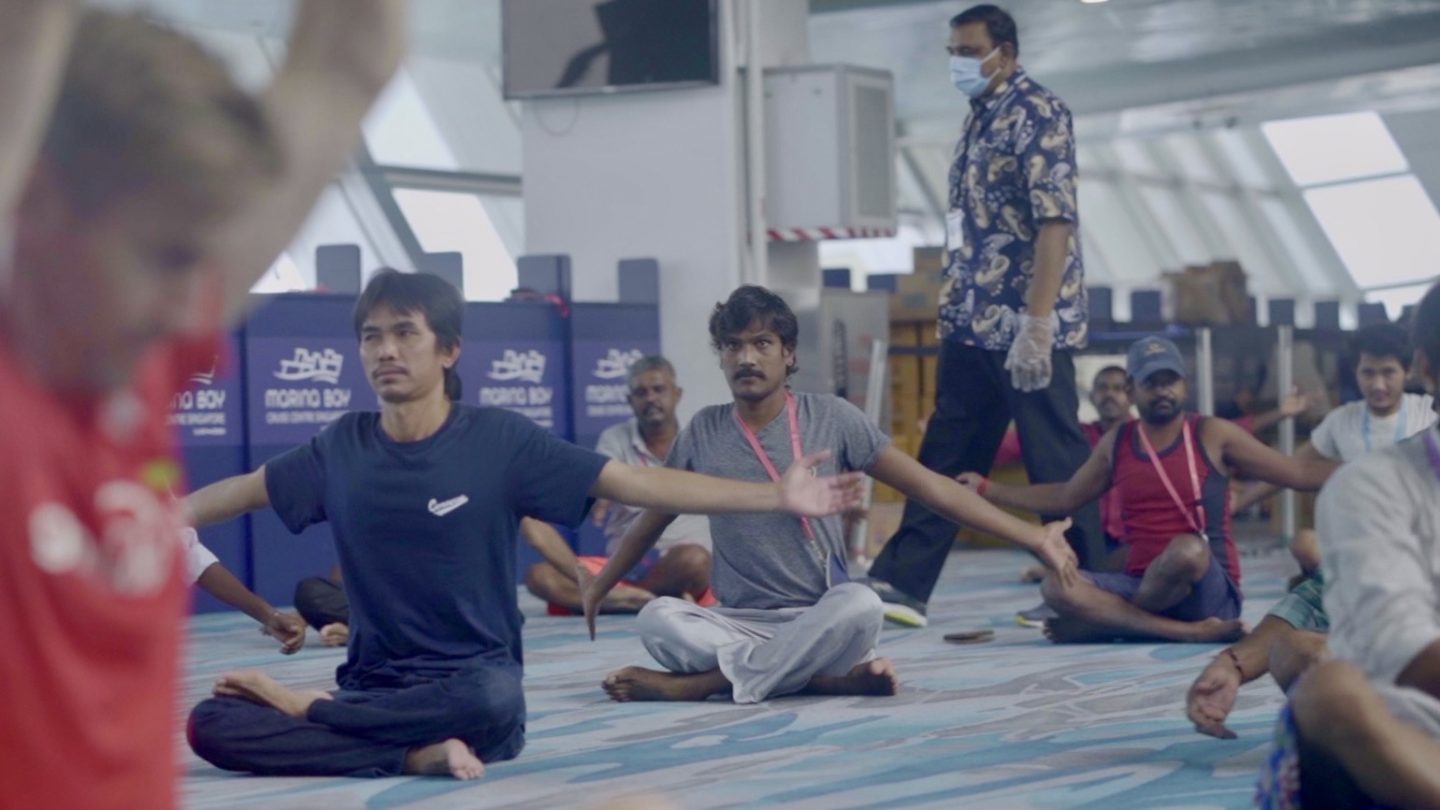
To alleviate cabin fever and low morale, staff and volunteers from NGO HealthServe engage the workers thrice a week with exercise, befriending sessions and a "minimart". Uthayakumar (in grey) said he had not stepped off the ship in 50 days. All photos by Herman Tan unless otherwise stated.
When 26-year-old Uthayakumar tested positive for COVID-19 on April 13, he was gripped with fear.
“I thought I was going to die,” said the Indian national, who had seen many migrant workers like himself fall ill from the virus as it swept through their dormitories.
About 90% of Singapore’s 45,000 cases have been from the migrant worker community.
Fortunately for Uthayakumar, who works as a painter in a shipyard, he only suffered mild symptoms like body aches and was allowed to leave Khoo Teck Puat Hospital after three days.
However, like most migrant workers struck with COVID-19, the hospital was only his first stop in what would be a long recovery journey – one that has not yet ended for him.
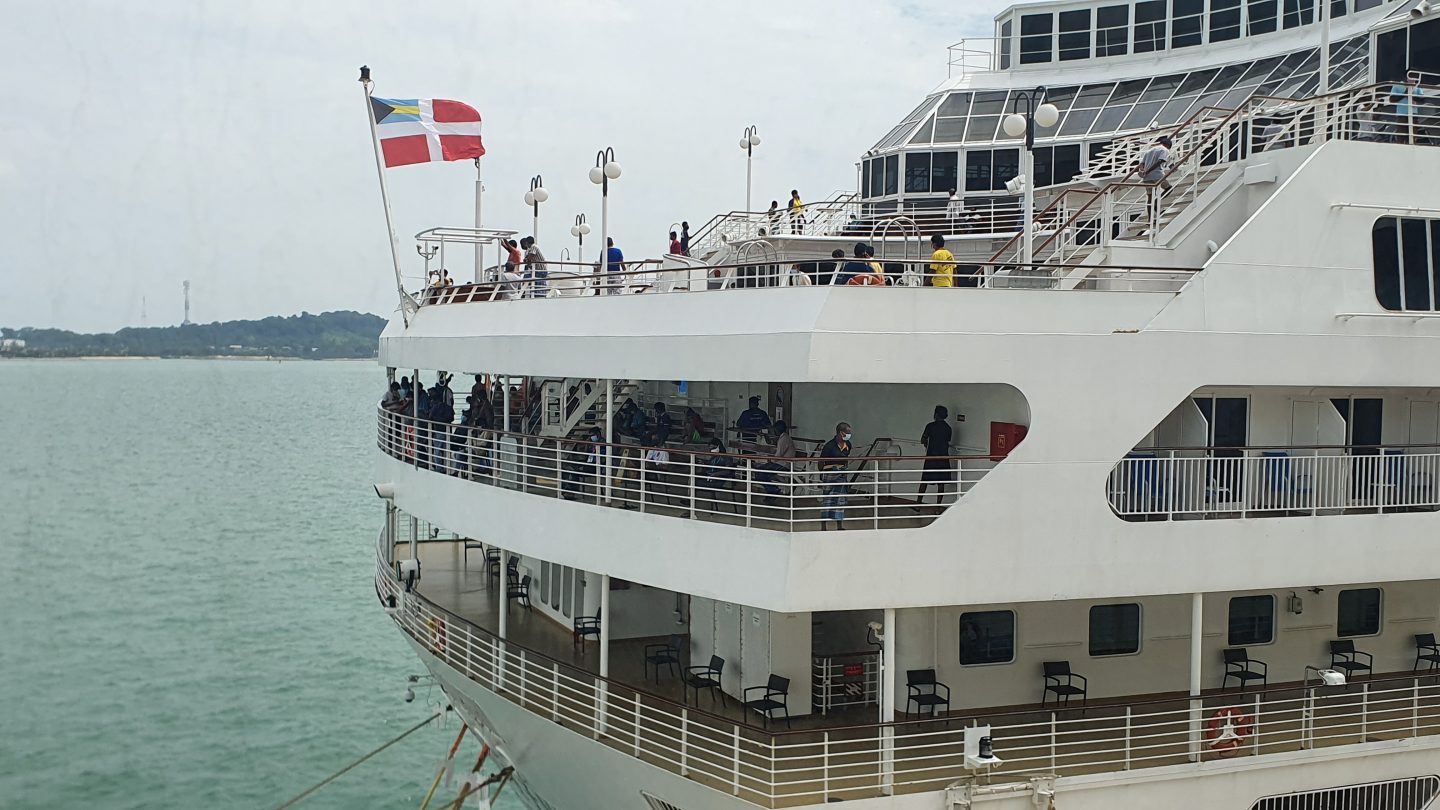
Cruise liners SuperStar Gemini and SuperStar Aquarius are serving as temporary alternative accommodation for about 2,500 workers as they wait to return to their dormitories. Photo courtesy of HealthServe.
After being discharged from hospital, Uthayakumar spent 15 days being cared for in the community care facility at Singapore Expo, which is meant for those with mild symptoms and lower risk factors.
After he was cleared of the virus, he was moved again to cruise liner SuperStar Gemini, where he has been staying for the past 50 days.
The ship, as well as a second cruise ship SuperStar Aquarius, have served as temporary alternative accommodation for more than 6,000 migrant workers who have fully recovered from COVID-19, as they wait to move back into their dormitories.
There are currently about 2,500 workers living on board.
According to Channel NewsAsia, the ships have en-suite toilets and in-cabin dining, as well as WiFi and entertainment in the cabins. Housekeeping and laundry services are also provided.
To keep the workers safe, fresh air is also filtered and supplied into the cabins and common areas, with no recirculation within the ship.
SuperStar Gemini and SuperStar Aquarius, which are docked on the opposite sides of Marina Bay Cruise Centre Singapore (MBCCS), received its first guests on April 29 and mid-May respectively.
A waiting game
But as the nation enjoys more freedom in Phase 2, many of these healthy workers – and thousands more in other facilities – are still not able to leave their accommodation.
While some on board have been cleared by the authorities to go back to work, Uthayakumar is not yet one of them.
“It’s mentally stressful for me. I would feel more at peace if I could return to work.”
He said he has spent every day for the past two months in the same routine: “Every day, I eat, sleep, exercise. Talk to my family, my wife and parents, on the phone. There are about five people from my company here. I also call them and talk to them for fun.”
While it may seem relaxing to live on a cruise liner, the reality for these isolated workers is that they grapple with cabin fever. The uncertainty of their future also weighs on their minds.
“It’s mentally stressful for me. I would feel more at peace if I could return to work,” said Uthayakumar.
It is an indefinite wait for him. While his boss has told him that he will be contacted “immediately” once the new dormitories are ready, he has not been told exactly when that will be.
Restoring dignity
To help alleviate and combat the effects of isolation and boredom among the workers, staff and volunteers from Christian non-profit organisation HealthServe have been running a programme for these workers thrice a week since June 10.
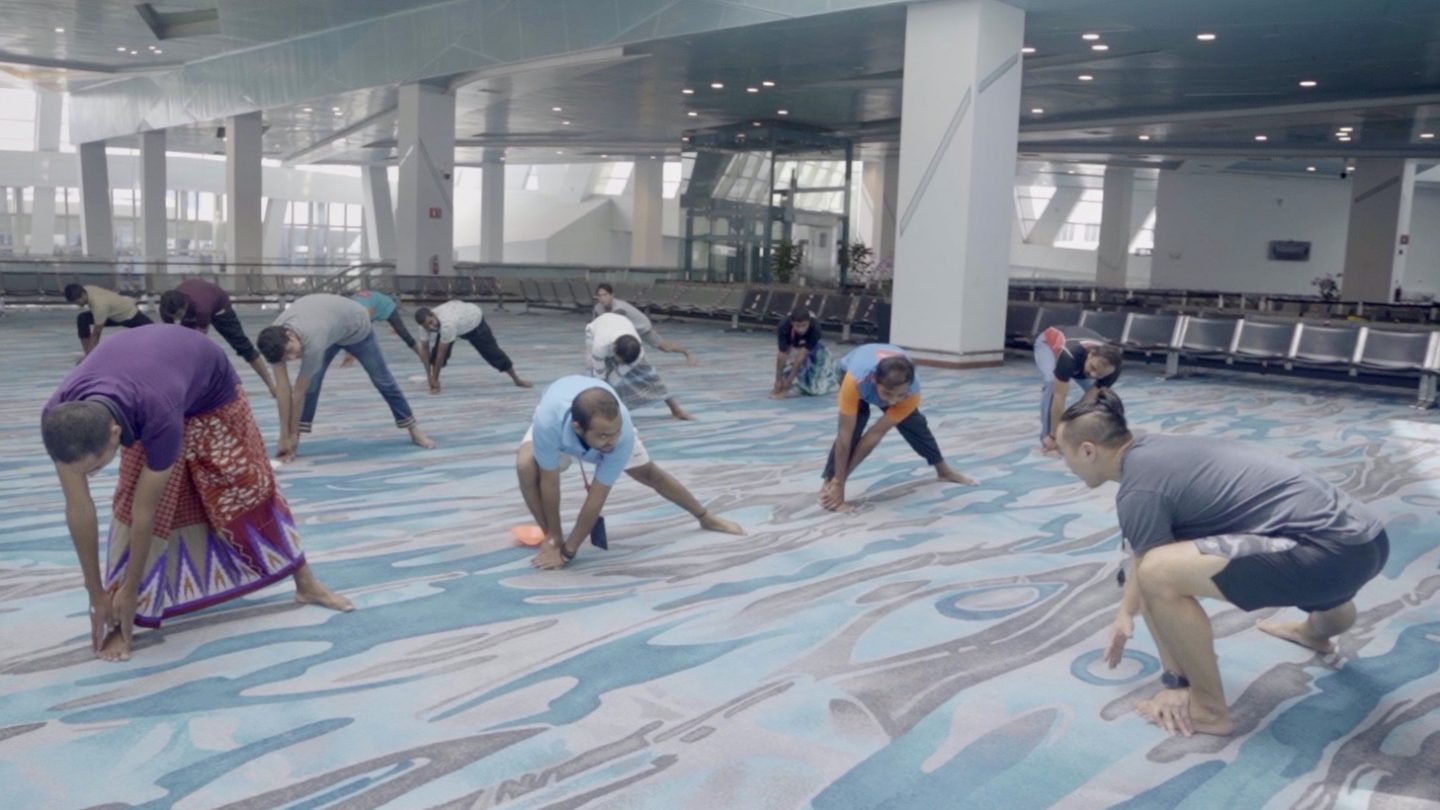
The men choose from a variety of activities during HealthServe’s two-hour engagement programme, including exercise and stretching classes, when they are allowed to remove their masks.
At the two-hour programme, which is held at MBCCS, the workers are free to choose from a variety of activities, from exercises and stretching, to thrift shopping and nail clipping.
“The whole point of this programme is to try and give them some dignity back.”
“The whole point of this programme is to try and give them some dignity back,” said HealthServe’s Suwen Low, who is in charge of the programme. “A way to give them back their dignity is to give them a choice.”
Freedom of choice has been taken away from them in the last couple of months as they have been moved from one facility to another, added Low, who is also the head of communications and engagement at HealthServe.
While the workers understand that all this is being done for their good, “since their COVID-19 journey began, their freedom of movement has been taken away. Their freedom of choosing the food they want has been taken away. Their freedom of choosing when to go back to work has been taken away”, she added.
No day, no night
When HealthServe first went on board the ships to speak with the workers, the team found that the workers’ mental wellbeing had been affected “quite drastically”, said Low.
Many of them were struggling to cope with the changes in their diet, spotty Internet connection and cabin fever, she said. Some who were living in windowless rooms could not tell day from night, she added.
“They were wondering: How long am I going to be here for? When can I go out?”
Others were asking to have their hair cut, having not gone to the barber in two to three months, while yet others were worried about not being able to send money home to their families.
Low said: “They were quite low in spirits when we met the first batch of them. They just felt that nobody cared about them, or that people had forgotten about them.
“They were wondering: How long am I going to be here for? When can I go out? When can I go back to my dorm? Those are the questions we got on a regular basis.”
HealthServe has since befriended more than 800 workers living on these cruise ships, said Low. Together with the ship operators and other stakeholders, steps have been taken to improve the WiFi and food, as well as provide remittance and barber services.
Bringing back the laughter
When Salt&Light visited one of the sessions last Tuesday (June 30), the men – who meet HealthServe in groups of 50 at a time – were excited to participate in the exercise and stretching classes. It is an activity which sees full attendance each time.
Until two weeks ago, the workers had only been allowed out of their rooms for about 45 minutes a day due to infection control measures. However, they are now allowed to walk around the open deck at staggered timings daily.
At the exercise corner, HealthServe volunteer Ian Chew, 31, led some men in jumping jacks, squats and jogging. They also played a game reminiscent of musical chairs that quickly had them all in boyish grins and laughter.
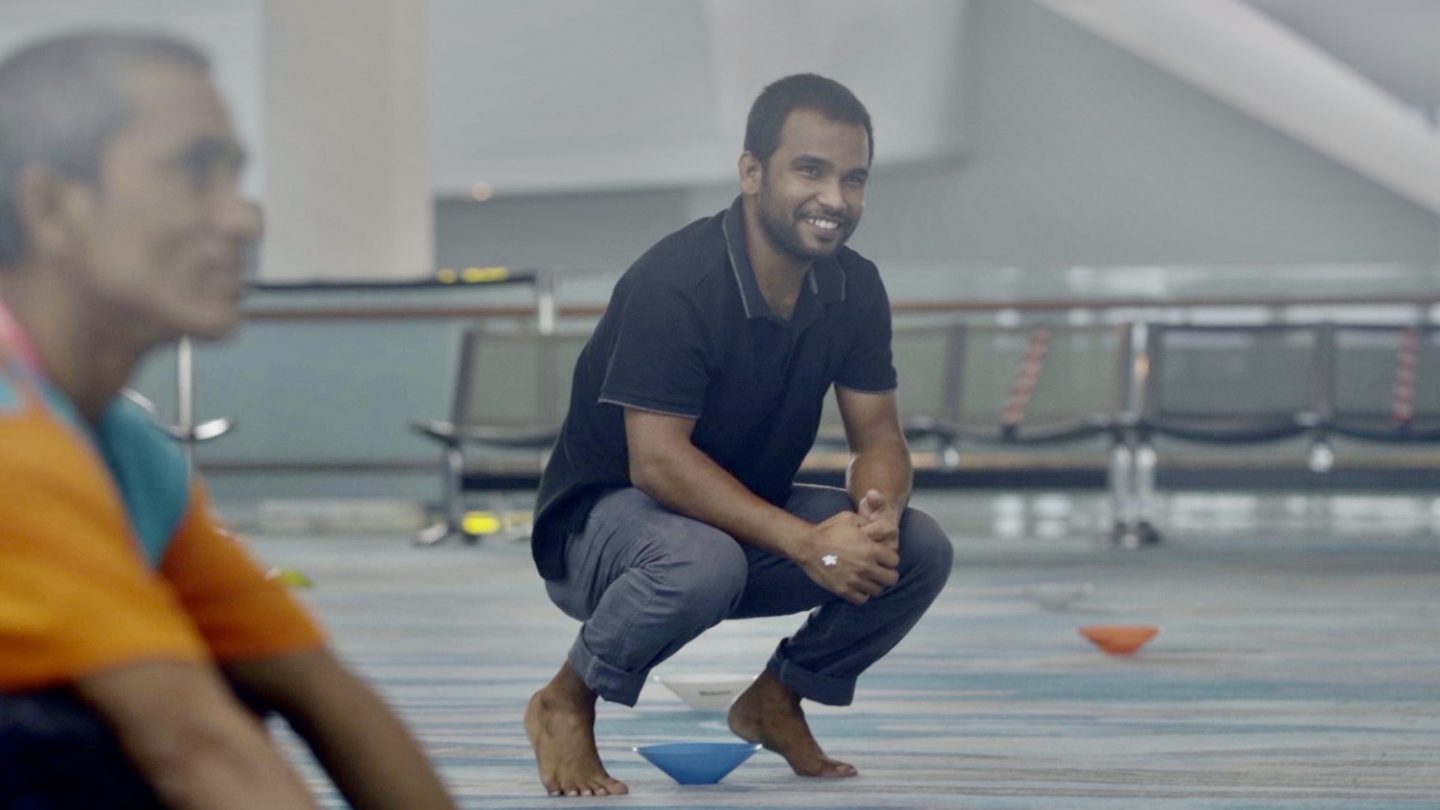
A game reminiscent of musical chairs had many workers sweaty and laughing. The men were allowed to remove their masks only for the stretching and exercise classes.
Chew, a professional fitness trainer, said: “If you’ve ever been in a confined space for more than a few days, you would know how much it takes a toll on your mental wellbeing. So we try to get them to smile a bit, try to give them a little bit of joy that they haven’t really experienced (in a while).”
“It has been many days since we have laughed.”
Over at the stretching corner, yoga instructor and international school teacher Luke Crosby, 35, led some men in a full body stretch.
When it was time to lie on their bellies and lift their their arms and legs off the ground, some wiggled their limbs playfully in the air. Others tried to stifle their laughter as they struggled to hold the pose.
The stretching session ended in a laughing exercise – arguably the most loved activity among the workers – that had most of them doubled over with laughter, with some even letting out boisterous howls.
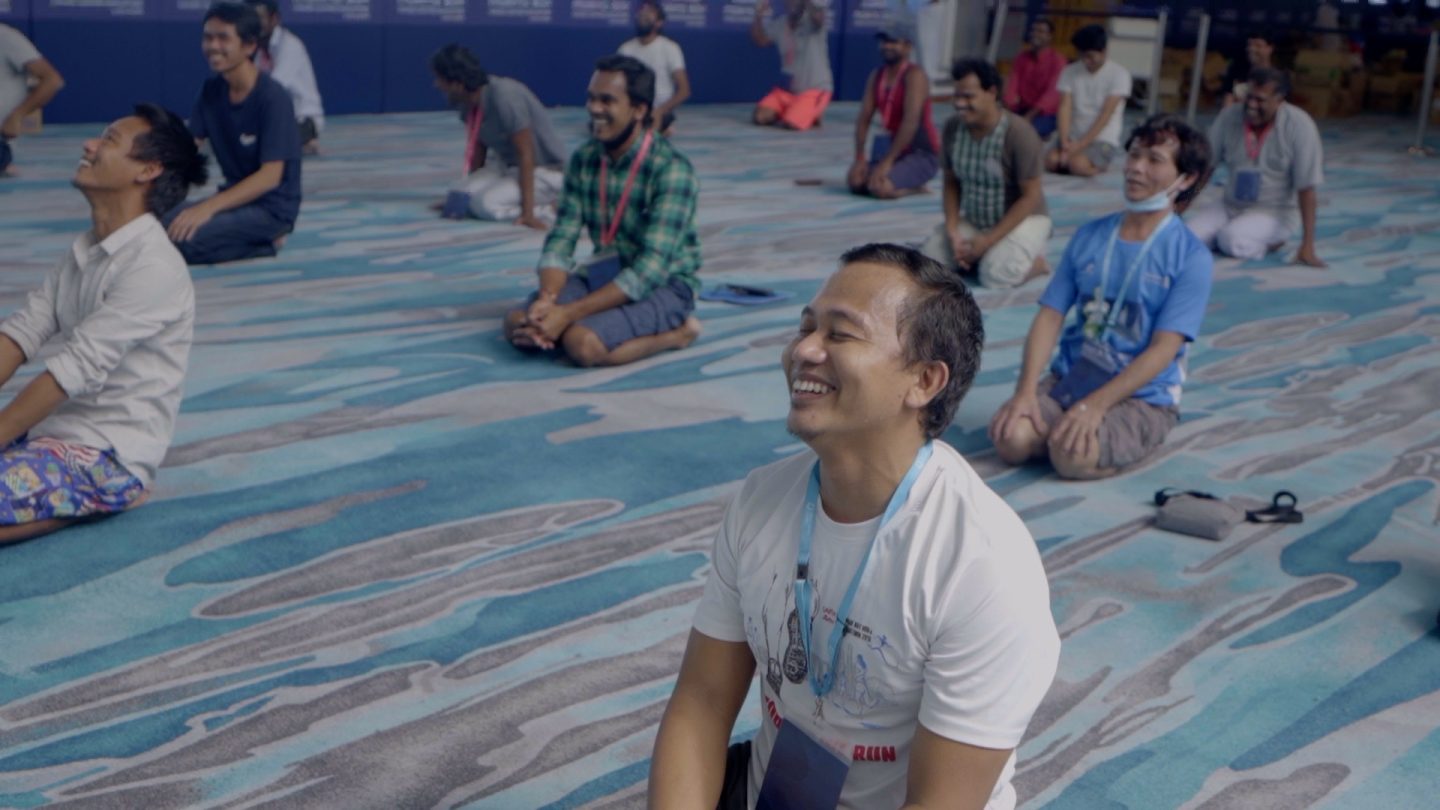
The laughing therapy exercise is popular among the migrant workers and word about it has gone “viral” on the ships, said Low.
Crosby, an Australian, said: “Laughter has been proven to increase those happy endorphins in the body. It fights diseases and boosts the immune system. So, even if it’s fake laughter, it’s good for them to exercise their diaphragm and those muscles.”
Some workers have enjoyed the stretches so much that they’ve asked Crosby to give them a programme to follow, while others have filmed the session so they can do it again in their rooms.
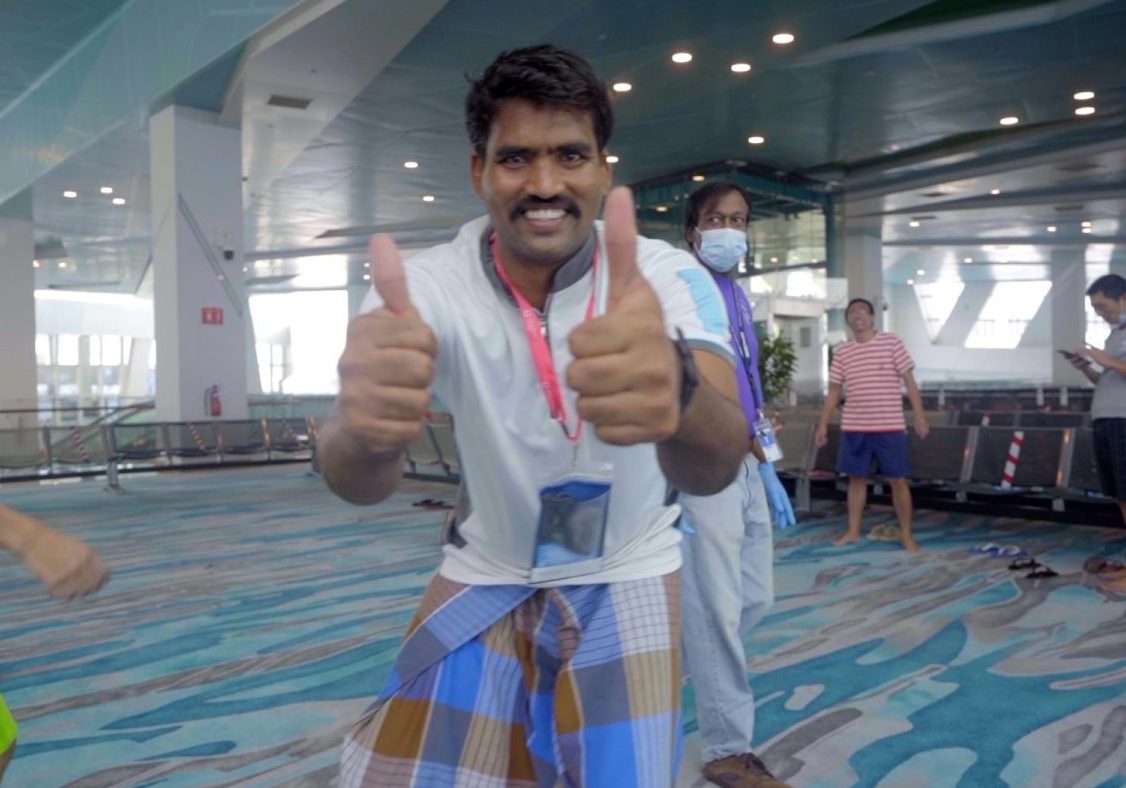
Smiles all around after the popular exercise sessions, which saw the men jogging and playing games.
“It has been many days since we have laughed,” said Uthayakumar, adding that this was the first time that he has set foot outside the ship since he first arrived in early May.
“I was very happy to be able to come out today. When we saw (the activities), we were so happy. We had tons of fun; it was very enjoyable.
“It would be nice if we had something like this every day!”
Thrift store
Apart from working out, the men also spent time at the thrift store, where they were allowed to pick and choose three items for free, including donated shirts, pants, lungis (sarong), shoes, bags and even new underwear.
Many workers only had the clothes on their back as they were moved all over Singapore during their recovery journey, said Low from HealthServe.
“Some of them have also told us that they’ve gotten their clothes stolen or accidentally lost or taken away. So that’s why the thrift store runs, to meet that need,” she said.
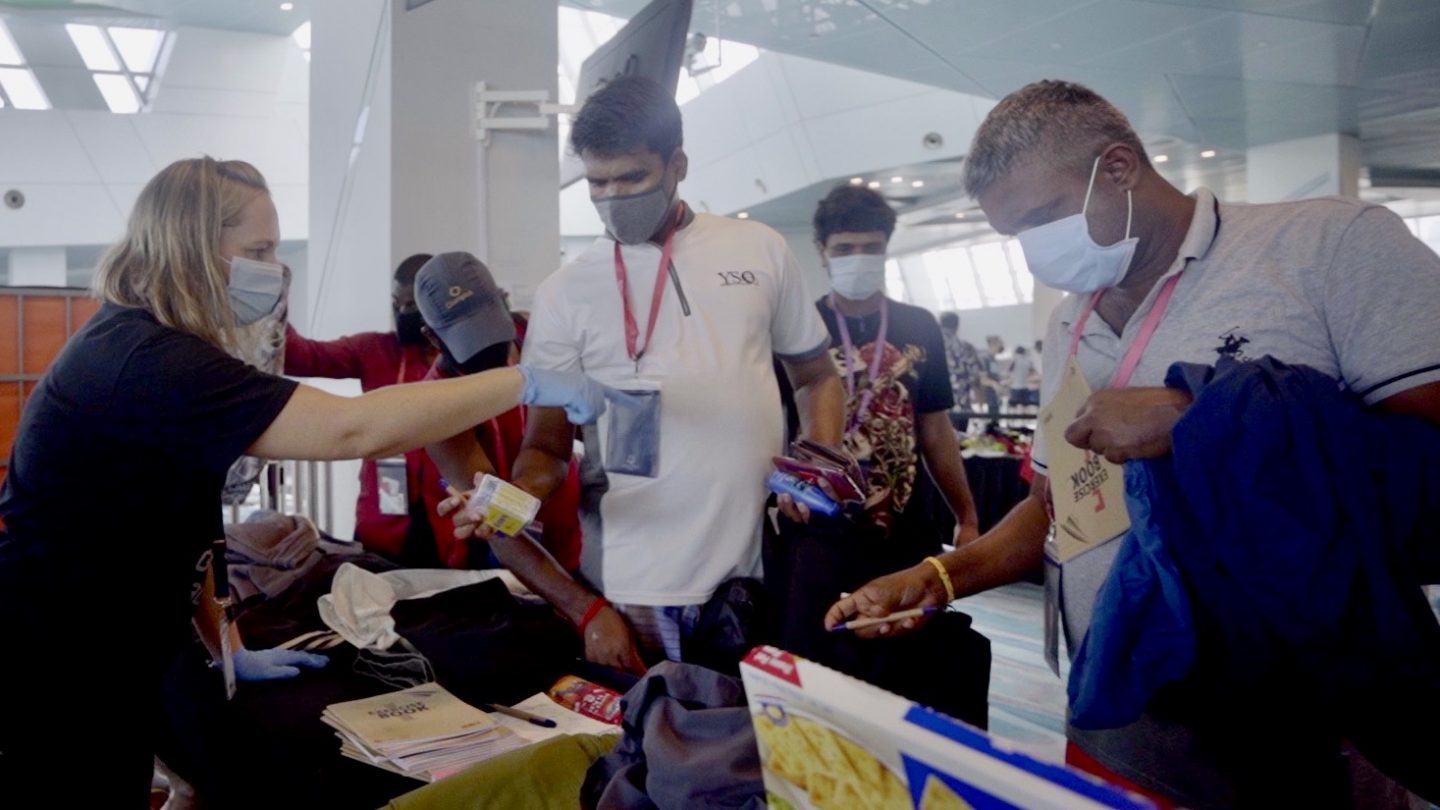
The workers could choose three free items from the thrift store, including donated shirts, pants, jackets, shoes, bags and even new underwear.
The men could also collect a pack of snacks and instant noodles, and chose from jars of biscuits like chanachur, muri and murukku — comfort snacks that reminded them of home.
Some, having not had their nails cut in months, opted to make use of the nail-cutting station, while others gathered in small groups to play carrom and card games.
The workers were also free to chat with staff and volunteers – including Bengali, Tamil, Chinese, Thai and Burmese speakers – if they were facing any problems, or if they simply needed a listening ear.
The best day
Sitthiphong Phansee, a 48-year-old construction worker, said: “Having been (on the ship) for 14 days, today is the best day. It’s a day that I feel at ease.
“I’m just stressed. But I can survive, I will be able to overcome.”
“What I liked best about today was that I could come out and see friends, chat with those whom I’ve worked together with before … I feel relaxed. It’s very good.”
Prior to coming onto the ship, he had spent a month in hospital and a month in an army camp. For almost three months, he has been killing time by watching television, exercising and resting.
“I’ve been feeling stressed and I miss home. I want to go back to work,” said Sitthiphong, a Thai.
After pausing for a few seconds to collect his thoughts, he added: “But I can survive, I will be able to overcome.
“(The people on the ship) look after us, they give us good support. Whatever it is, I’m here now, I’ll try my best to overcome.”
We are here
At the end of each programme, there is a stark difference in the workers’ demeanour, said HealthServe volunteer Tim Tan, 57.
“When you see them come in, normally they’ve got long faces, looking down and kind of depressed. But then they get to exercise and interact with people … By the time they leave, there are smiles on their faces,” he said.
Low said HealthServe’s heart for these migrant brothers is founded on God’s Word, which exhorts believers to love and care not just their neighbours, but also the foreigners in our country (Deuteronomy 10:18-19; Zechariah 7:9).
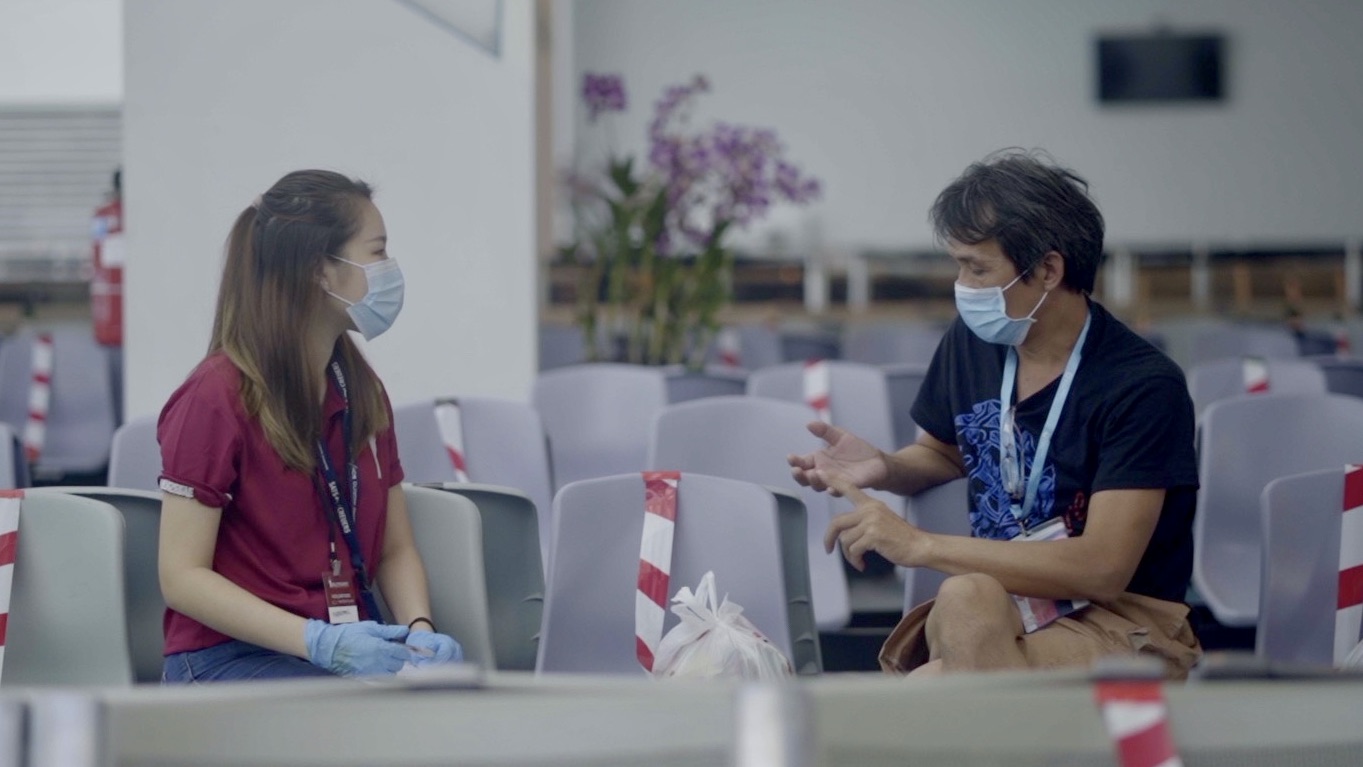
During the programme, the workers could also speak with volunteers in their native languages to share any of their problems. Low said that the volunteers hope to be a family of sorts to the men.
She shared that, as a Malaysian working in Singapore, she too understands what it’s like being in a country “where you don’t have a lot of family around”.
“You’re lonely. You’re a bit lost, you’re confused. Even worse when you don’t speak the language,” she said.
“We need to treat them well, letting them know that somebody is here for them no matter what. Someone cares. If you need any help, we’re here.
“Your family may not be here, but we are here.”
"Someone else will do it?" That someone is you.
“When you hear one person’s story here, it’s a tragedy. But when you hear 40,000 people’s stories, they just become a statistic,” said Ian Chew, 31, a volunteer at HealthServe, on how we tend to grow more indifferent to the plight of the migrant workers the more we hear about them in the news.
“It can be easy to think of the 40,000 migrant workers who have been affected by COVID-19 … and think, okay the government is taking care of them and so we don’t need to do anything about it.”
But, as believers who are exhorted to love the foreigners in our midst, one thing that we can all do is to pray for the workers and all who are involved in the caring of these workers, said Chew, who is from Katong Presbyterian Church.
“Change has to start with us – in our heart and in our mind.”
On how the body of Christ can pray for these workers, Suwen Low, head of communication and engagement at HealthServe, said: “We can pray that they won’t lose their jobs and they will have peace and understanding during this period. Pray that all of them will be treated with dignity and respect.
“We can also pray for the people who are making decisions about the processes, protocols and laws affecting the workers now – that they will be empathetic and wise, and do so with real understanding of the situation on the ground.”
Chew added that the body of Christ can also only pray that churches and Christians will step forward to volunteer to journey alongside these men as they go through this unsettling time.
“It’s very easy for us as Singaporeans to just hear (about them) and then not do anything about it. There’s this ‘someone else will do it’ syndrome,” he said.
“So I think the first thing is to just say, I want to do it. What can I do? If you’re willing to do something to help, then I think that is something you should pray for – for God to use you – and then see what happens after that.”
Pray for a change of heart in our community, where people realise that these workers are no different from us, added Tim Tan, 57, another HealthServe volunteer.
“Our brothers here are working to build up the country for us, to keep us safe by building good housing and providing services in the community,” added Tan, who owns two building materials companies and regards these workers as his colleagues.
“As Christians, I think we should accept them more openly. Learn how we can live together. So, the change has to start within us – in our heart and in our mind.
“We can no longer have this attitude of Not-In-My-Backyard … Let’s treat them as we would treat ourselves. Let’s not tuck them away in the far corners of Singapore,” said Tan, who is from Covenant Community Methodist Church.
If you would like to contribute to HealthServe’s work on the cruise ships and in other areas, you can check out their donation page here. They also accept donations-in-kind.
HealthServe is also looking for volunteers who can speak Tamil, Bengali, Thai, Burmese and Chinese fluently, as well as people who can hold stretching, exercise or dance classes for the migrant workers. Those who are interested may write in to [email protected]
TOUCH International is also looking for donations of working smartphones for migrant workers so they can install contact tracing applications. For more information, visit their Facebook page.
#WelcomeInMyBackyard campaign urges Singaporeans to show warmth to migrant workers
We are an independent, non-profit organisation that relies on the generosity of our readers, such as yourself, to continue serving the kingdom. Every dollar donated goes directly back into our editorial coverage.
Would you consider partnering with us in our kingdom work by supporting us financially, either as a one-off donation, or a recurring pledge?
Support Salt&Light


